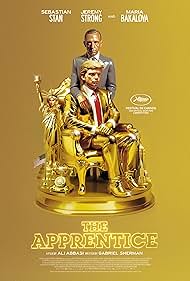The story of how a young Donald Trump started his real estate business in the 1970s and 80s in New York City with the help of infamous attorney Roy M. Cohn. Roger Stone, a longtime associate of Donald Trump and Roy M. Cohn, acknowledged that Jeremy Strong’s portrayal of Cohn was “unsurpassed in its accuracy.” [From the trailer] Roy Cohn: Rule Three: No matter what, you claim victory and never admit defeat. Featured in Project 7PM: Episode of October 11, 2024 (2024). Against Anti AntiPerformed by Consumers Licensed to Domino Publishing Company Limited (PRS) obo In The Red RecordingsWritten by Paul B. CutlerPublished by BMG Rights Management (UK) Limited. The title “Apprentice” refers to Donald Trump’s TV show and Trump’s relationship with his mentor, Roy Cohn. The film is neither a tear-jerker nor a glowing testimonial. It is much more nuanced and complex. The first half of the film is set in 1973. Donald Trump is collecting rent from tenants. He and his father are being sued by the Justice Department for housing discrimination. Their lawyers are urging them to settle the case and move on. But then the 27-year-old Trump meets Roy Cohn. A shadowy figure on the fringes of right-wing politics (he became known as a chief adviser to Joseph McCarthy’s communist witch hunt), Cohn suggests that Trump take the initiative and target the federal government. Since Cohn is responsible, the case is dismissed without admitting wrongdoing. Cohn also guides Trump through the machinations of New York City politics, helping him take control of a shuttered Commodore Hotel, secure city government tax cuts, and eventually turn the property into the Hyatt Hotel Grand Central Station. Along the way, Cohn teaches an impressionable Trump his three rules: 1) attack, attack, attack, 2) deny everything, admit nothing, 3) no matter what actually happens, always claim victory. The last half of the film takes place in the early 1980s. Trump unveils his eponymous tower. He convinces himself that the Atlantic City Casino will be his path to untold riches. And he hires a writer to write “The Art of the Deal.” By this point, he has thoroughly mastered the art of self-promotion. It’s based on the “Apprentice” concept; it’s an origin story. Iranian-Danish director Ali Abbasi (“Holy Spider,” “Border”) and “Vanity Fair”; writer Gabriel Sherman makes a convincing case that Trump was created, almost created, by Roy Cohn. But Cohn’s influence eventually fades. Even as Trump’s star rises in the 1980s, Cohn is disgraced (forbidden to steal clients) and ostracized. He eventually dies of AIDS (although he claimed to his dying breath that he was suffering from liver cancer). By the time “The Art of the Deal” is over, it’s time to see the film. is published, Trump has decided that Cohn’s three rules and his own fame were based on Trump’s ideas all along. Director Abbasi also points to the strange confluence of factors that helped Trump flourish: a ruthless, win-win version of capitalism that idolizes those who succeed; a legal system easily manipulated by the wealthy to crush opponents or delay their own day of reckoning (the film received a “cease and desist” order from Trump’s lawyers after its screening in Cannes); a U.S. political system that has no idea how to restrain an individual who operates according to Cohn’s three rules. The acting here is excellent. As Roy Cohn, Jeremy Strong (Kendall in the TV series “The Heredity”) is simply delightful. He convincingly embodies Cohn’s internal contradictions, a lawyer who shows utter contempt for the legal system, a Jew who embraces anti-Semitism, a closeted gay man who publicly humiliates homosexuality at every opportunity.



 35/49
35/49